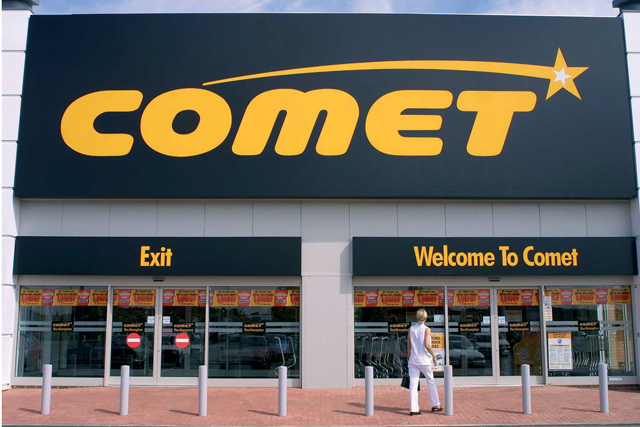Comet, the second-biggest UK electrical specialist retailer, after Dixons, entered administration earlier this month, putting about 6000 jobs at risk.
Comet was founded in 1933 as Comet Battery Stores, a business that charged batteries for wireless sets. Its collapse is the latest in a long line of high-street casualties, and the most high-profile retail failure since the demise of Woolworths in 2008.
In Comet's own sector, US electrical chain Best Buy's withdrawal from the UK last year after struggling to gain a foothold offered a sign of the tough times facing the category.
Private equity firm OpCapita bought Comet from Kesa less than a year ago, for just £2. The business has succumbed to fierce competition from online retailers and supermarkets, while the recession has also hit it hard, with many consumers shying away from spending on 'big-ticket' items.
According to its administrator Deloitte, many of Comet's customers are first-time home buyers, meaning the business was also affected by the prevailing tough conditions in the UK mortgage market. In addition, it failed to secure the trade credit insurance needed to safeguard suppliers.
Comet remains open, however, and Deloitte is seeking a buyer for its leftover stock and stores. With rivals, including Dixons and Maplin, understood to have expressed an interest in some of the assets, what should any potential buyer do to improve the business?
Marketing asked Tim Fairs, marketing and ecommerce director at Clinton Cards, a former head of advertising at Comet itself and head of marketing at Dixons, and Neil Godber, strategy director at ad agency Bartle Bogle Hegarty. The latter was previously at M&C Saatchi, where he worked on planning Currys'
service positioning, which led to its 'Star Wars' TV and print ads and the Dixons 'Last place you want to go to' campaign.
COMET STATS
£35m - Comet's estimated operational losses in the year to 30 April 2012
240 - Comet stores in operation
Source: various media
BRAND HEALTH CHECK DIAGNOSIS
 TIM FAIRS, Marketing and ecommerce director, Clinton Cards (former head of advertising at Comet Group)
TIM FAIRS, Marketing and ecommerce director, Clinton Cards (former head of advertising at Comet Group)
Comet has failed to invest in its stores and service at a time when Dixons has raised its game. Customers in this sector are doing their research and shopping online to a greater degree, rather than risk venturing to a store, for fear of shoddy advice and a sub-standard product selection.
Before you've left the store, you'll be told your shiny new product is likely to break, and then be offered an extended guarantee that's not wanted or valued - particularly in today's 'disposable' society.
The 'Come and Play' campaign was intended to change brand perception, but in many instances, the bold claims being made did not tally with customers' experiences, and brand credibility was damaged.
Remedy
- Redefine recruitment policy - place product knowledge at the heart of brand purpose.
- Develop a radical format, making stores a 'technology-shopping mecca'.
- Upgrade the online offer to include advice, based on independent reviews from third-party experts who customers can trust.
 NEIL GODBER, Strategy director, Bartle Bogle Hegarty (formerly of M&C Saatchi, where he worked on the Currys account)
NEIL GODBER, Strategy director, Bartle Bogle Hegarty (formerly of M&C Saatchi, where he worked on the Currys account)
Even before the economic slump, electrical and technology retailing was both a tough and tempting market.
On one hand, the latest products offered excitement, from futuristic experiences in the living room to lifestyle statements for the kitchen.
On the other, competitors had broken up what was an historically homogeneous market, with Asda and Tesco taking the category basics; Amazon offering low-priced convenience and a wide choice; and Dixons (with Best Buy for a while) using its know-how to educate and enthuse those looking for technology.
Against this backdrop, Comet has been left behind, offering neither rock-bottom prices nor technological expertise.
Remedy
- Low prices are a given, but any solution must go beyond this.
- The stores and staff are still key assets and could provide a platform for the future.
- While Dixons has embraced the more exciting tech end of the market, no one has offered low prices allied to common-sense service geared to older consumers.


